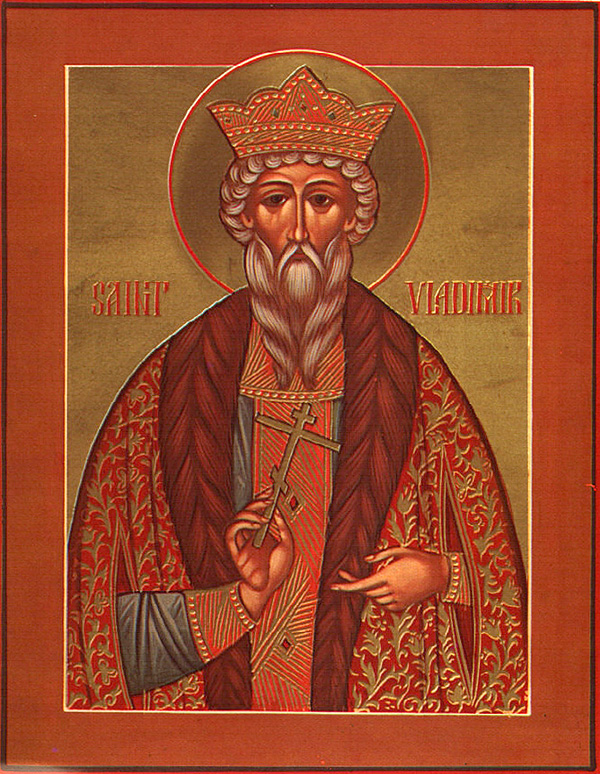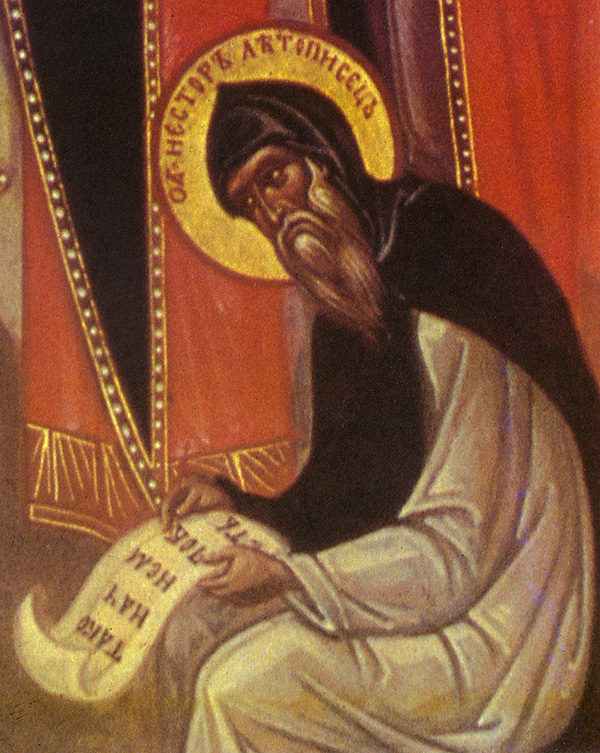Saint Vladimir of Kiev

Prince Vladimir of Kiev (r. 978–1015) ruled a domain that stretched from beyond Novgorod in the north to beyond Kiev in the south. He understood the importance of religion not only for the spiritual life of his people, but also for their political, social, and cultural advancement. At first he promoted devotion to the ancient gods and goddesses of the Slavs, such as Perun, Khors, Dazh’bog, Stribog, Simar’gl, and Mokosh.
But in 986 he began to take interest in the religions of other lands—Islam in Old Bulgaria, Judaism in Khazaria, Roman Catholicism in the Holy Roman Empire, and Greek Orthodox Christianity in Byzantium. In the following year, he sent emissaries to see for themselves these various religions in action. Their report upon their return to Kiev is given in the Russian Primary Chronicle (the earliest written historical account of the Slavs, traditionally attributed to Saint Nestor, a monk in the Kievan Caves Monastery who died in the early 12th century):
‘When we journeyed among the Bulgars, we beheld how they worship in their temple, called a mosque, while they stand ungirt. The Bulgar bows, sits down, looks hither and thither like one possessed, and there is no happiness among them, but instead only sorrow and a dreadful stench. Their religion is not good. Then we went among the Germans, and saw them performing many ceremonies in their temples; but we beheld no glory there. Then we went to Greece, and the Greeks (including the Emperor himself) led us to the edifices where they worship their God, and we knew not whether we were in heaven or on earth. For on earth there is no such splendor or such beauty, and we are at a loss how to describe it. We only know that God dwells there among men, and their service is fairer than the ceremonies of other nations. For we cannot forget that beauty.’

Then the Chronicle relates, “Then the boyars [the noblemen] spoke to Vladimir and said, ‘If the Greek faith were evil, it would not have been adopted by your grandmother Olga who was wiser than all other men.’ Vladimir then inquired where they should all accept baptism, and they replied that the decision rested with him.”
Having made up his mind to adopt Orthodox Christianity for himself and his people, Vladimir took an armed force to the Byzantine city of Cherson on the Crimean Peninsula, and besieged and captured it. Then he sent a message to Emperor Basil II of Byzantium (r. 976–1025) and his brother Constantine VIII, asking for the hand of their sister Princess Anna in marriage. They replied, “It is not proper for Christians to marry pagans. If you are baptized, you shall have her as your wife, inherit the kingdom of God, and be our companion in the Faith. Unless you do so, however, we cannot give you our sister in marriage.” Vladimir responded, saying that he had already given some study to the Greeks’ Faith and was ready to be baptized. The Greeks replied, telling Vladimir to come to Constantinople to be baptized. But when he then requested that he be baptized in Cherson by priests brought by Anna herself, they acceded to his wishes.
According to the Chronicle, before Anna and the priests arrived in Cherson, the prince contracted a very serious eye disease. But when he was baptized, taking the name Basil, not only did he receive spiritual healing, but his physical ailment was also miraculously healed—much as Saint Paul received back his sight when he was baptized by Ananias after being blinded by the vision of Christ on the road to Damascus (Acts 9.17–19). A few days later, Prince Vladimir was united with Anna in marriage.
Upon his return to Kiev, his capital city, in the spring of the year 988, the people of the city and the surrounding countryside joyfully accepted to be baptized in the Dniepr River in the new Faith of their beloved prince. Thus began the history of the Orthodox Church in the lands of Rus’.
Beginning with his baptism, Vladimir experienced a genuine spiritual conversion. He put aside his many concubines and his otherwise wild and violent way of life, and lived in sober and respectful monogamy with Princess Anna. Together they did much to establish Christian principles in their realm, and to enlighten their subjects with the Orthodox Faith. For his personal and official acts of righteousness as a Christian prince, Vladimir has been glorified as a saint of the Church, as “Equal-to-the-Apostles, Enlightener of the Russian Lands.”

Saint Vladimir’s grandmother, the great Princess Olga (d. 969), was the wife of Igor, the ruler of the Kievan state. Upon Igor’s death in 945, Olga ruled as regent for their son, Svatoslav, until he assumed power in 961. In about 957, Olga accepted the Christian Faith and was baptized, probably in Constantinople. She also is recognized as a saint of the Church—like her illustrious grandson, as “Equal to the Apostles.”
